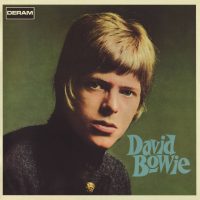 Written by: David Bowie
Written by: David Bowie
Recorded: 8, 9 December 1966
Producer: Mike Vernon
Engineer: Gus Dudgeon
Released: 1 June 1967
Available on:
David Bowie
Personnel
David Bowie: vocalsDerek Boyes: harpsichord
Dek Fearnley: bass guitar
John Eager: drums
Unknown session musicians
The opening song on side two of David Bowie’s debut album, ‘Little Bombardier’ is a tale of a lonely former soldier, run out of town after befriending two young children.
The song appears to have been inspired by ‘Uncle Ernest’, a short story by Alan Sillitoe in his 1959 collection The Loneliness of the Long Distance Runner. The protagonist of Sillitoe’s story is a lonely middle-aged upholsterer, Ernest Brown, who befriends two pre-adolescent sisters in a cafe, eventually ending up in debt after buying them food, drink and presents.
As days and weeks passed, and as Alma noticed how much Ernest depended on them for company, how happy he was to see them, and how obviously miserable when they did not come for a day – which was rare now – she began to demand more and more presents, more food, more money, but only in a particularly naive and childish way, so that Ernest, in his oblivious contentment, did not notice it.But certain customers of the cafe who came in every day could not help but see how the girls asked him to buy them this and that, and how he always gave in with a nature too good to be decently true, and without the least sign of realizing what was really happening. He would never dream to question their demands, for to him, these two girls whom he looked upon almost as his own daughters were the only people he had to love.
‘Uncle Ernest’
Although there is no suggestion that Brown was motivated by anything other than loneliness, two police officers warn him to stay away from the girls, saying they had been watching him for some time. Crushed by the knowledge that his time with Alma and Joan had ended, Brown seeks solace in drink.
Bowie’s song follows a similar theme, although there are several key differences. His protagonist is Frankie Mear, a hard-drinking former member of the armed forces. Mear befriends two children at “the picture house” where he spends much of his time. The cinema is depicted as a place of escapism and joy, just as it would be in 1971’s ‘Life On Mars?’, whereas Sillitoe’s story is set in the altogether more humdrum surroundings of a crowded café. And crucially, Bowie’s song ends in exile for Frankie Mear, rather than the alcoholic oblivion of Ernest Brown.
When Bowie’s debut album was released in the US by London Records, the song title was misspelt ‘Little Bombadier’ on the back cover. This was one of two errors, the other being ‘Silly Boy Blues’.
In the studio
‘Little Bombardier’ was recorded on 8 and 9 December 1966 at Decca’s Studio 2 in north London, along with the songs ‘Sell Me A Coat’, ‘Silly Boy Blue’, and ‘Maid Of Bond Street’.
Although Bowie rarely recorded songs in 3/4 time, this was one of two such waltzes taped during these sessions, the other being ‘Maid Of Bond Street’.
‘Little Bombardier’ was also the final song recorded for Bowie’s debut BBC radio session, for the Top Gear show. The appearance was taped on 18 December 1967 at Piccadilly 1 Studios, 201 Piccadilly in London, and first broadcast on Christmas Eve.
Bowie’s BBC radio version of the song was performed with the Arthur Greenslade Orchestra. It was included on the deluxe edition of his debut album in 2010, along with the other songs from the session: ‘Love You Till Tuesday’, ‘In The Heat Of The Morning’, ‘Silly Boy Blue’, and ‘When I Live My Dream’.


It is likely that Frankie does not meet the children at an ABC picture house (https://en.wikipedia.org/wiki/ABC_Cinemas). As he is eating ice cream that the children longingly observe, it’s more likely he meets them at a local A.B.C. (https://en.wikipedia.org/wiki/Aerated_Bread_Company), a cafe place (or places) which was often named checked in a lot of classic British literature. This would mean the song is set in a pre-1955 London, as A.B.C. shops closed then.